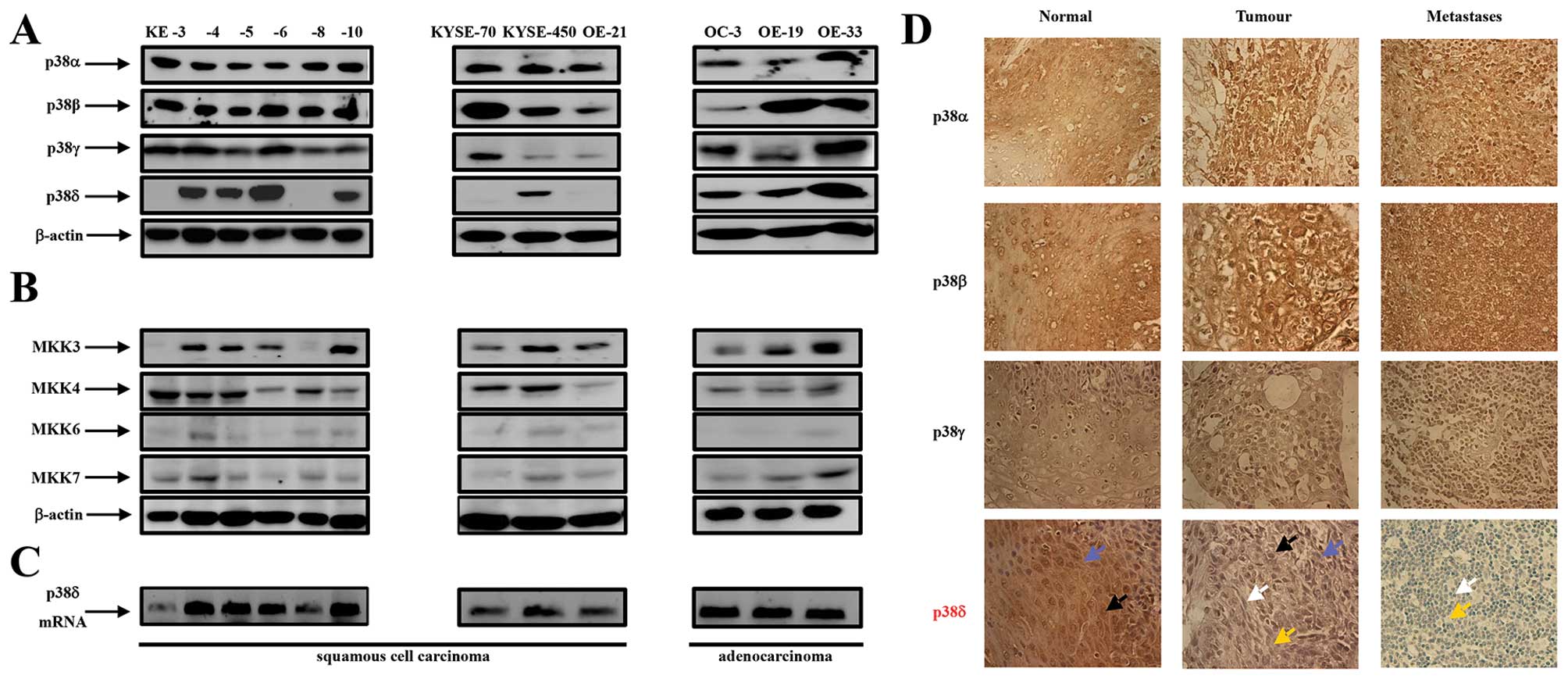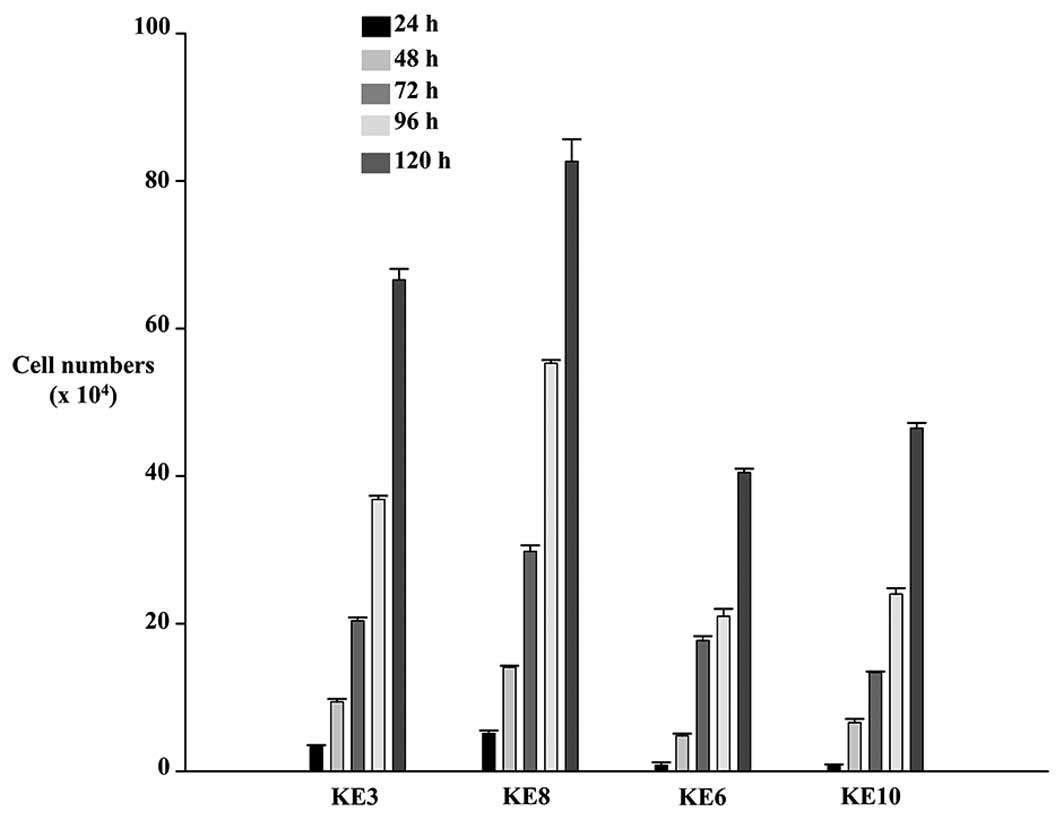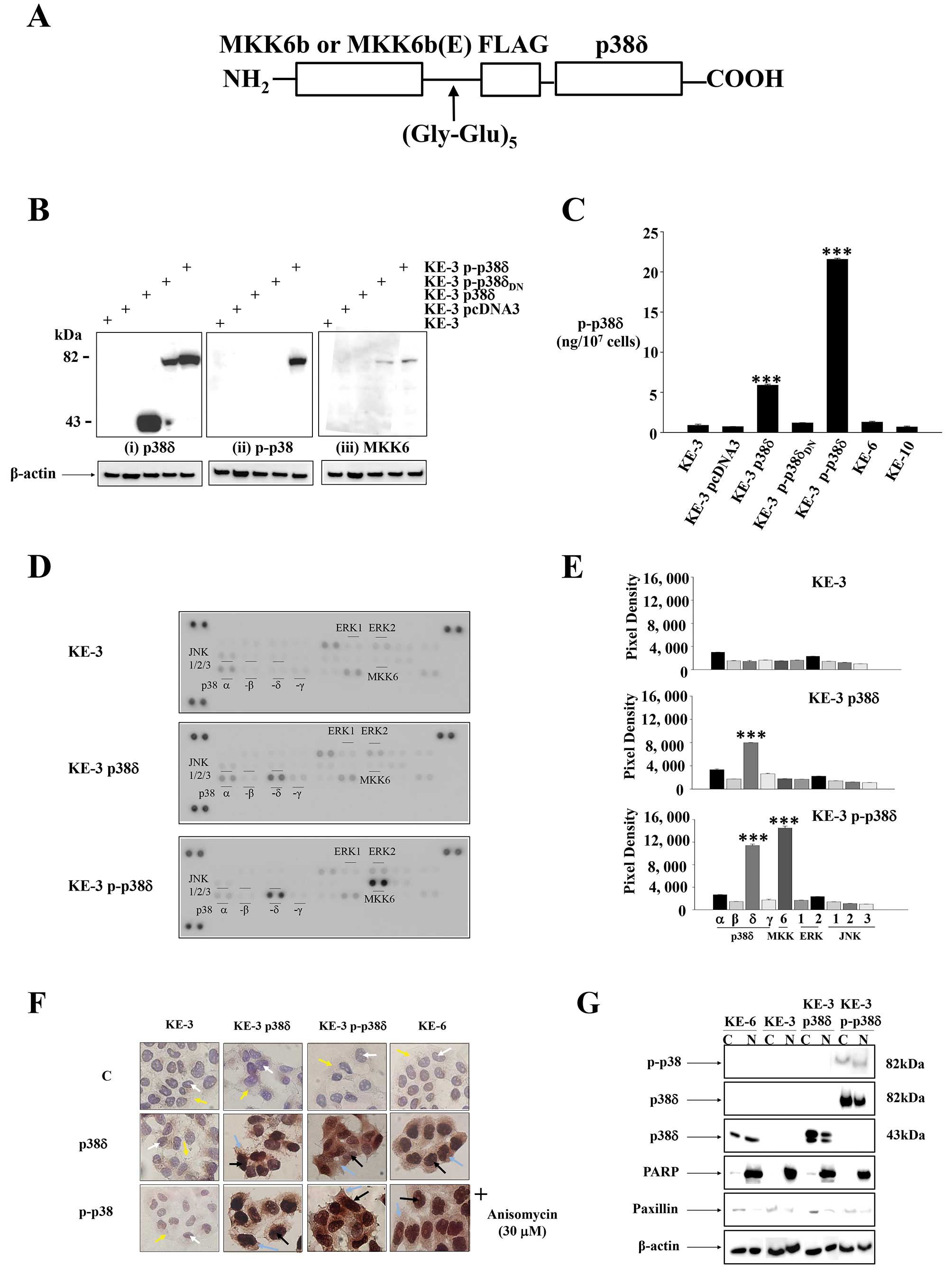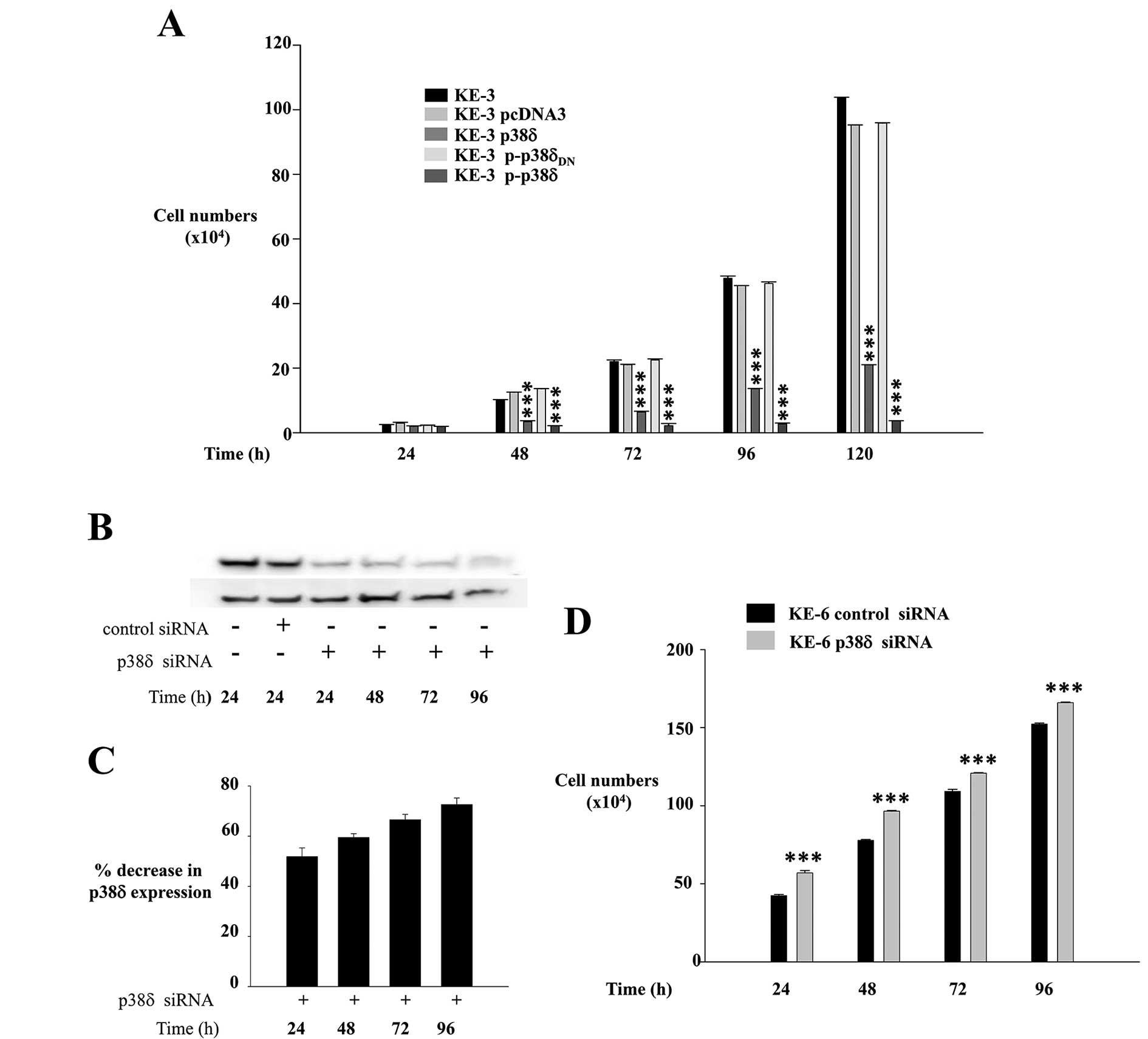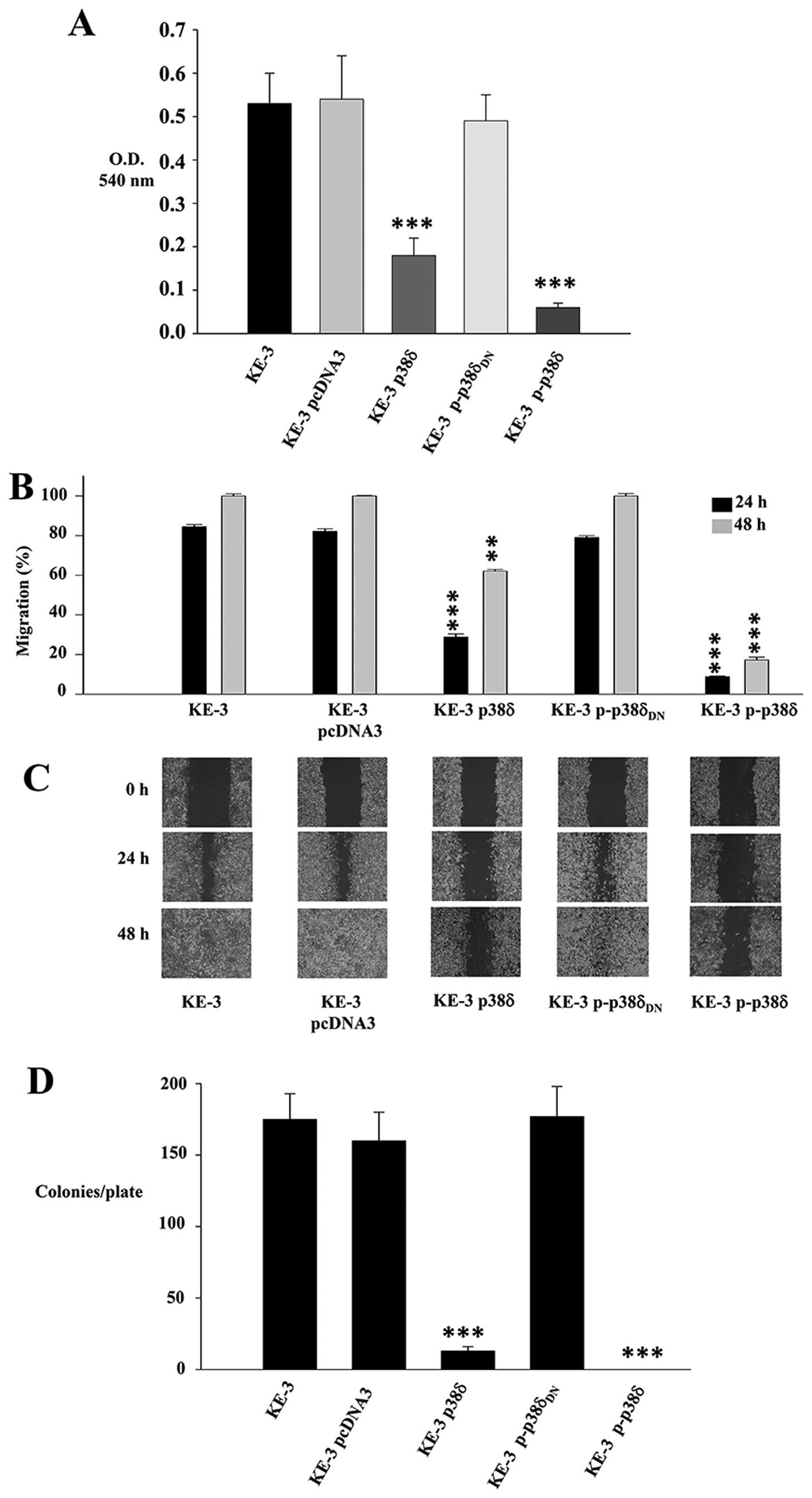|
1.
|
Kayani B, Zacharakis E, Ahmed K and Hanna
GB: Lymph node metastases and prognosis in oesophageal carcinoma -
a systematic review. Eur J Surg Oncol. 37:747–753. 2011. View Article : Google Scholar : PubMed/NCBI
|
|
2.
|
Enzinger PC and Mayer RJ: Esophageal
cancer. N Engl J Med. 349:2241–2252. 2003. View Article : Google Scholar : PubMed/NCBI
|
|
3.
|
Almhanna K and Strosberg JR: Multimodality
approach for locally advanced esophageal cancer. World J
Gastroenterol. 18:5679–5687. 2012. View Article : Google Scholar : PubMed/NCBI
|
|
4.
|
Thallinger CM, Kiesewetter B, Raderer M
and Hejna M: Preand postoperative treatment modalities for
esophageal squamous cell carcinoma. Anticancer Res. 32:4609–4627.
2012.PubMed/NCBI
|
|
5.
|
Klein CA and Stoecklein NH: Lessons from
an aggressive cancer: evolutionary dynamics in esophageal cancer.
Cancer Res. 69:5285–5288. 2009. View Article : Google Scholar : PubMed/NCBI
|
|
6.
|
Bird-Lieberman EL and Fitzgerald RC: Early
diagnosis of oesophageal cancer. Br J Cancer. 101:1–6. 2009.
View Article : Google Scholar
|
|
7.
|
Sanz V, Arozarena I and Crespo P: Distinct
carboxy-termini confer divergent characteristics to the
mitogen-activated protein kinase p38α and its splice isoform Mxi2.
FEBS Lett. 474:169–174. 2000.PubMed/NCBI
|
|
8.
|
Raman M, Chen W and Cobb MH: Differential
regulation and properties of mapks. Oncogene. 26:3100–3112. 2007.
View Article : Google Scholar : PubMed/NCBI
|
|
9.
|
Hui L, Bakiri L, Mairhorfer A, Schweifer
N, Haslinger C, Kenner L, Komnenovic V, Scheuch H, Beug H and
Wagner EF: P38alpha suppresses normal and cancer cell proliferation
by antagonizing the jnk-c-jun pathway. Nat Genet. 39:741–749. 2007.
View Article : Google Scholar : PubMed/NCBI
|
|
10.
|
Ono K and Han J: The p38 signal
transduction pathway: activation and function. Cell Signal.
12:1–13. 2000. View Article : Google Scholar
|
|
11.
|
Zarubin T and Han J: Activation and
signaling of the p38 MAP kinase pathway. Cell Res. 15:11–18. 2005.
View Article : Google Scholar : PubMed/NCBI
|
|
12.
|
Kyriakis JM and Ayruch J: Mammalian MAPK
signal transduction pathways activated by stress and inflammation:
a 10-year update. Physiol Rev. 92:689–737. 2012.PubMed/NCBI
|
|
13.
|
Cuenda A and Rousseau S: p38 MAP-kinases
pathway regulation, function and role in human diseases. Biochim
Biophys Acta. 1773:1358–1375. 2007. View Article : Google Scholar : PubMed/NCBI
|
|
14.
|
Eyers PA, Craxton M, Morrice N, Cohen P
and Goedert M: Conversion of SB 203580-insensitive MAP kinase
family members to drug-sensitive forms by a single amino-acid
substitution. Chem Biol. 5:321–328. 1998. View Article : Google Scholar : PubMed/NCBI
|
|
15.
|
Yamana H, Kakegawa T, Tanaka T, Higaki K,
Fujii T and Tou U: Experimental studies on immunotargeting therapy
for esophageal carcinoma. Gan To Kagaku Ryoho. 21:755–760.
1994.PubMed/NCBI
|
|
16.
|
Tsukahara T, Nabeta Y, Kawaguchi S, Ikeda
H, Sato Y, Shimozawa K, Ida K, Asanuma H, Hirohashi Y, Torigoe T,
Hiraga H, Nagoya S, Wada T, Yamashita T and Sato N: Identification
of human autologous cytotoxic T-lymphcyte-defined osteosarcoma gene
that encodes a transcriptional regulator, papillomavirus binding
factor. Cancer Res. 64:5442–5448. 2004. View Article : Google Scholar
|
|
17.
|
Nakao M, Yamann H, Imai Y, Toh Y, Toh U,
Kimura A, Yanoma S, Kakegawa T and Hoir K: HLA A2601-restricted
CTLs recognize a peptide antigen expressed on squamous cell
carcinoma. Cancer Res. 55:4248–4252. 1995.PubMed/NCBI
|
|
18.
|
Barry OP, Mullan B, Sheehan D, Kazanietz
MG, Shanahan F, Collins JK and O’Sullivan GC: Constitutive ERK1/2
activation in esophagogastric rib bone marrow micrometastatic cells
is MEK-independent. J Biol Chem. 276:15537–15546. 2001. View Article : Google Scholar : PubMed/NCBI
|
|
19.
|
Pramanik R, Qi X, Borowicz S, Choubey D,
Schultz RM, Han J and Chen G: p38 isoforms have opposite effects on
AP-1-dependent transcription through regulation of c-Jun. The
determinant roles of the isoforms in the p38 MAPK signal
specificity. J Biol Chem. 278:4831–4839. 2003. View Article : Google Scholar
|
|
20.
|
Zheng C, Xiang J, Hunter T and Lin A: The
JNKK2-JNK1 fusion protein acts as a constitutively active c-Jun
Kinase that stimulates c-Jun transcription activity. J Biol Chem.
274:28966–28971. 1999. View Article : Google Scholar : PubMed/NCBI
|
|
21.
|
O’Sullivan GC, Tangney M, Casey G, Ambrose
M, Houston A and Barry OP: Modulation of p21-activated kinase 1
alters the behavior of renal cell carcinoma. Int J Cancer.
121:1930–1940. 2007.PubMed/NCBI
|
|
22.
|
Chen L, Zhang JJ and Huang XY: cAMP
inhibits cell migration by interfering with Rac-induced
lamellipodium formation. J Biol Chem. 283:13799–13805. 2008.
View Article : Google Scholar : PubMed/NCBI
|
|
23.
|
Adhikary G, Chew YC, Reece EA and Eckert
RL: PKC-delta and -eta, MEKK-1, MEK-6, MEK-3 and p38-delta are
essential mediators of the response of normal human epidermal
keratinocytes to differentiating agents. J Invest Dermatol.
130:2017–2030. 2010. View Article : Google Scholar
|
|
24.
|
Cargnello M and Roux P: Activation and
function of the MAPKs and their substrates, the MAPK-activated
protein kinases. Microbiol Mol Biol Rev. 75:50–83. 2011. View Article : Google Scholar : PubMed/NCBI
|
|
25.
|
Wagner EF and Nebreda ÁR: Signal
integration by JNK and p38 MAPK pathways in cancer development. Nat
Rev Cancer. 9:537–549. 2009. View Article : Google Scholar : PubMed/NCBI
|
|
26.
|
Ambrose M, Ryan A, O’Sullivan GC, Dunne C
and Barry OP: Induction of apoptosis in renal cell carcinoma by
reactive oxygen species: involvement of extracellular
signal-regulated kinase 1/2, p38delta/gamma, cyclooxygenase-2
down-regulation and translocation of apoptosis-inducing factor. Mol
Pharmacol. 69:1879–1890. 2006. View Article : Google Scholar
|
|
27.
|
Remy G, Risco AM, Iñesta-Vaquera FA,
González-Terán B, Sabio G, Davis RJ and Cuenda A: Differential
activation of p38MAPK isoforms by MKK6 and MKK3. Cell Signal.
22:660–667. 2010. View Article : Google Scholar : PubMed/NCBI
|
|
28.
|
Reid TD, Sanyaolu LN, Chan D, Williams GT
and Lewis WG: Relative prognostic value of TNM7 vs TNM6 in staging
oesophageal cancer. Br J Cancer. 105:842–846. 2011. View Article : Google Scholar : PubMed/NCBI
|
|
29.
|
Junttila MR, Ala-aho R, Jokilehto T,
Peltonen J, Kallajoki M, Grenman R, Jaakkola P, Westermarck J and
Kähäri V-M: p38α and p38δ mitogen-activated protein kinase isoforms
regulate invasion and growth of head and neck squamous carcinoma
cells. Oncogene. 26:5267–5279. 2007.
|
|
30.
|
Efimova T, Broome A-M and Eckert RL:
Protein kinase Cδ regulates keratinocyte death and survival by
regulating activity and subcellular localization of a
p38δ-extracellular signal-regulated kinase 1/2 complex. Mol Cell
Biol. 24:8167–8183. 2004.
|
|
31.
|
Efimova T, Broome AM and Eckert RL: A
regulatory role for p38δ MAPK in keratinocyte differentiation.
Evidence for p38δ-ERK1/2 complex formation. J Biol Chem.
278:34277–34285. 2003.
|
|
32.
|
Li Q, Zhang N, Zhang D, Wang Y, Lin T,
Wang Y, Zhou H, Ye Z, Zhang F, Lin S-C and Han J: Determinants that
control the distinct subcellular localization of p38α-PRAK and
p38β-PRAK complexes. J Biol Chem. 283:11014–11023. 2008.PubMed/NCBI
|
|
33.
|
Fan L, Yang X, Du J, Marshall M, Blanchard
K and Ye X: A novel role of p38α MAPK in mitotic progression
independent of its kinase activity. Cell Cycle. 4:1616–1624.
2005.
|
|
34.
|
Tang J, Qi X, Mercola D, Han J and Chen G:
Essential role of p38γ in K-Ras transformation independent of
phosphorylation. J Biol Chem. 280:23910–23917. 2005.
|
|
35.
|
Del Barco Barrantes I and Nebreda AR:
Roles of p38 MAPKs in invasion and metastasis. Biochem Soc Trans.
40:79–84. 2012.PubMed/NCBI
|
|
36.
|
Izzo JG, Luthra R, Sims-Mourtada J, Chao
KSC, Lee JH, Wu T-T, Correa AM, Luthra M, Aggarwal B, Hung M-C and
Ajani JA: Emerging molecular targets in esophageal cancers.
Gastrointest Cancer Res. 1:S3–S6. 2007.PubMed/NCBI
|
|
37.
|
Bulavin DV and Fornace AJ: p38 MAP
kinases’s emerging role as a tumour suppressor. Adv Cancer Res.
92:95–118. 2004.
|
|
38.
|
Hui L, Bakiri L, Stepniak E and Wagber EF:
p38α a supressor of cell proliferation and tumorigenesis. Cell
Cycle. 6:2429–2433. 2007.
|
|
39.
|
Ventura JJ, Tenbaum S, Perdiguero E, Huth
M, Guerra C, Barbacid M, Pasparakis M and Nebreda AR: p38α MAP
kinase is essential in lung stem and progenitor cell proliferation
and differentiation. Nat Genet. 39:750–758. 2007.
|
|
40.
|
Schindler EM, Hindes A, Gribben EL, Burns
CJ, Yin Y, Lin M-H, Owen RJ, Longmore GD, Kissling GE, Arthur JSC
and Efimova T: p38δ mitogen-activated protein kinase is essential
for skin tumor development in mice. Cancer Res. 69:4648–4655.
2009.
|
|
41.
|
Cerezo-Guisado MI, Del Reino P, Remy G,
Kuma Y, Arthur JSC, Gallego-Ortega D and Cuenda A: Evidence of p38γ
and p38δ involvement in cell transformation processes.
Carcinogenesis. 32:1093–1099. 2011.
|
|
42.
|
Sundaramurthy P, Gakkhar S and Sowdhamini
R: Analysis of the impact of ERK5, JNK and p38 kinase cascades on
each other: a systems approach. Bioinformation. 3:244–249. 2009.
View Article : Google Scholar : PubMed/NCBI
|
|
43.
|
Ambrosino C, Mace G, Galban S, Fritsch C,
Vintersten k, Black E, Gorospe M and Nebreda AR: Negative feedback
regulation of MKK6 mRNA stability by p38α mitogen-activated protein
kinase. Mol Cell Biol. 23:370–381. 2003.PubMed/NCBI
|
|
44.
|
Coulthars LR, White DE, Jones DL,
McDermott MF and Burchill SA: p38MAPK: stress responses
from molecular mechanisms to therapeutics. Trends Mol Med.
15:369–379. 2009.
|
|
45.
|
Gaestel M and Kracht M: Peptides as
signalling inhibitors for mammalian MAP kinase cascades. Curr Pharm
Des. 15:2471–2480. 2009. View Article : Google Scholar : PubMed/NCBI
|















